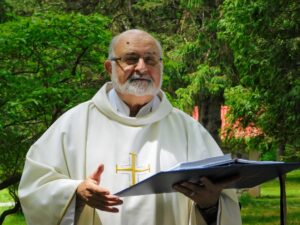By Sonalika Goswami
Boston University News Service
Father Rocco Puopolo sat back in his office chair in the Xaverian missionaries of Holliston as he recalled the day he was shot by the 11-year-old boy in his school in Sierra Leone, West Africa. He was the director at the post-secondary institution, which was 40 miles away from the insurgent’s headquarters during the Sierra Leone Civil War. That morning in 1997, when he had just begun his duties, the young soldiers, all aged around 11, attacked the center to loot.
“We were warned that they were coming but we stayed anyway,” Rocco said. One of the soldiers struck up a conversation with him. “In an African sense, that boy became a friend of mine, or I became a friend of his, because we chatted for 10-15 minutes,” he said.
When he realized he was getting no benefit out of the conversation, he “politely excused himself” to join the other boys who were already vandalizing the property. The boys reached the section of mass wine and started drinking. They caused no physical harm.
Later, at around 4 p.m., the boy, thinking he had befriended the priest, came back drunk and asked him to unlock the office so that they could loot all the valuables. Rocco replied that he had moved everything to his apartment which they had already looted so there was nothing left. The boy tried to force him out of the way.
“I said I wanted to stay where I was. He started wrestling and pulling me to the door … He had an AK-47 and he shot it near my foot to scare me,” he said. The bullet went into his thigh. “I didn’t see it, I didn’t feel it. He did and he ran away,” he said.
When Fr. Rocco walked back to his living room, where his colleagues were hiding, they informed him that he was shot. He was in denial. When he looked down, he realized it was true. The co-workers tried to stop the bleeding and then they walked three miles towards the bushes where it felt like a safer place.
While he was walking on his wounded leg, all he could think of was Jesus on the cross praying.
“I was praying for the young boy who at 11 years old had no intention of harming me, but saw that he did … he had shot a priest,” said Fr. Rocco.
As they were walking towards the bush, in his mind he could hear the colleagues ask, “Why did you stay? This war is not about you and now you are harmed.”
He replied, “It’s like a marriage. There are good days and bad days. This was a bad day.”
What he felt was a deep love for people and that he was willing to give his life for them and those he knew were willing to give their lives for people like him. That was an enlightening moment for him. He knew he had come on the right path in life.
“It was a powerful experience to confirm that I was in the right place,” he said.
*He continued working on women’s cooperatives and youth empowerment in the school until 1999. Rocco worked in reconciliation and peace studies with people of all ages, including nurses, teachers and doctors, who would be the first people to meet the returning refugees when the war ended. When the insurgents targeted the priest, they withdrew from the country.
His journey while serving in Sierra Leone
After his first year of graduate school, he was sent as an intern in Sierra Leone, where he fell in love with the place. Three years later, during the 1960s, the Xaverian brothers, a separate Belgian missionary group, approached Rocco to be one of them. When he refused their offer and insisted on staying a priest, he was sent back as a high school teacher against his will. He served there as the superintendent and an employer of 800 Catholic teachers for four years.
During his time serving in Sierra Leone, Rocco traveled through Europe, mostly in the missionary’s headquarters in Italy, which is also home to many retired priests. Rocco also shared an emotional connection with Italy as it is his mother’s birthplace. He would often visit his aunt there who never went to the United States. The community back then had limited people from the United States or Africa.
“Today, 50 years later, we are a very diverse community,” he said. “Our largest number of students come from Central Africa. Today, many international communities are becoming multicultural. So that’s a big change.
During the 1970s, most of the students came from Italy and about 10% of them were from Spain, UK or the US. Presently, the highest number of people serving at the missionaries in Sierra Leone are from Congo.
In 1991, when the war began, the school had set up a training camp for the trainers so that they could know “what the refugees went through and help them heal.”
Sierra Leone had 15,000 child soldiers when the war began. “Many of the wars till today are fought by children,” he said. “It’s really obnoxious.”
Childhood in Boston
As a young boy, Rocco was surrounded by a family that made regular visits to church. He dreamt of becoming an architect, doctor or priest. When growing up in Boston, he found the city Bishop inspirational with a “global sense” while serving as the director of the mission office. Cardinal Cushing, with his activities, uplifted many young men to join the missionaries. Rocco decided to become a priest at 10 years old with early support from his mother and grandmother. He wished to serve in Asia.
“But the joke of it is I never went to Asia,” Rocco said.
When the time came, he had the opportunity to serve in the islands of Sumatra in Indonesia, but the administrators of his mission instructed him to move to Africa in the end.
A friend and former member of the community, Charlie Vernon, said, “Fr. Rocco is a good man and I think he is the perfect fit as a superior in charge of the community. The way he helps everyone around is inspiring.”
Present day in Holliston
Returning to a state of calm in his light bearded face, he described his daily life at the age of 73 in Holliston where he and the Xaverian priests pray and eat together.
Each of them have their assigned tasks. Rocco is in charge of the gardens at the Xaverian missionary, which are large. He spends a lot of his time there.
The administrator in charge of the Xaverian missionary, Susan Martell, said, “I see this whole place as a family and he is the head of the family. I sometimes see him as a father because he has to deal with all the emergencies around here.”








